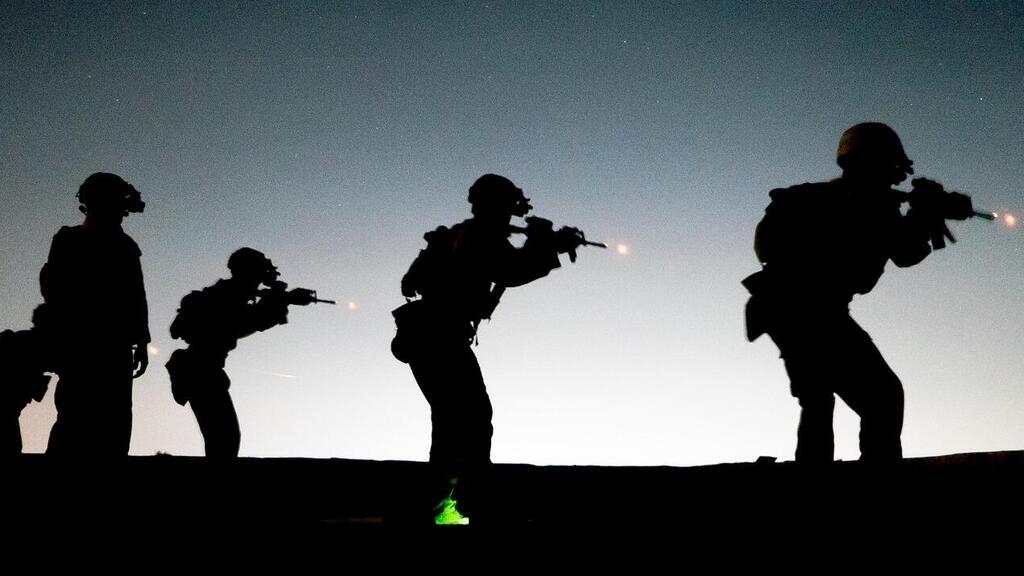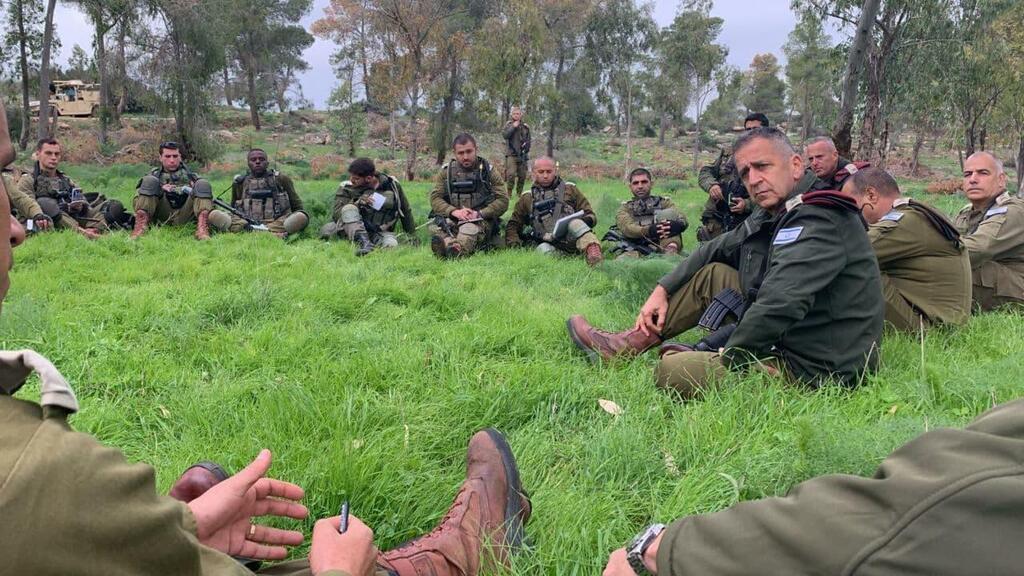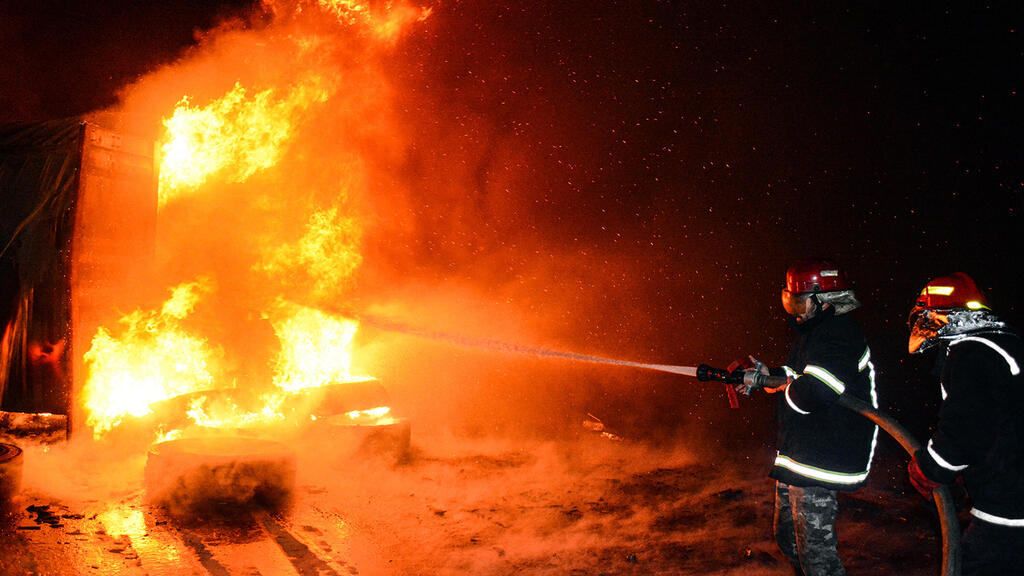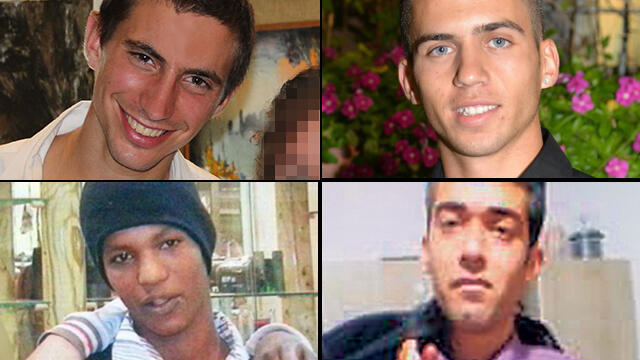Getting your Trinity Audio player ready...
As 2021 is drawing to a close, the Israeli military earlier this week released its end-of-year review where it gave an unusually optimistic assessment on Israel's security situation for the upcoming year.
According to the annual report, the number of Israeli fatalities in terror attacks in the West Bank over the past year has been relatively low, while the nationalist crime committed by extremist Jews has seen an increase.
5 View gallery
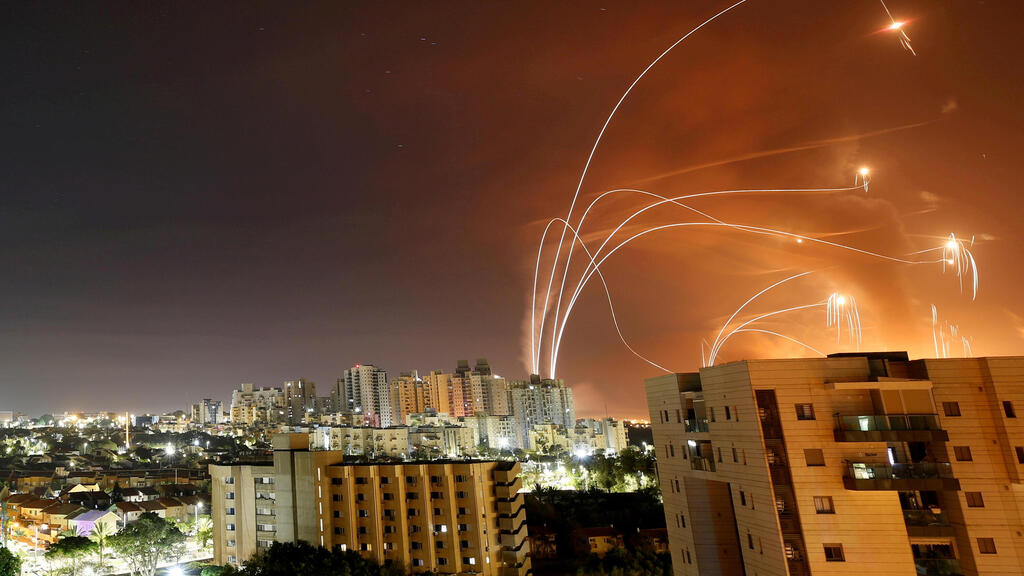

Streaks of light are seen as Israel's Iron Dome anti-missile system intercept rockets launched from the Gaza Strip towards Israel, as seen from Ashkelon,
(Photo: Reuters)
The report also praised the normalization agreements signed with a number of Arab of states, saying it has likely contributed to the relatively stable security situation over the past year. The report added that deepening crises experienced by neighboring countries, such as Lebanon and Syria, along with the continued cooperation between Israel and other Arab states in the wake of the Iranian nuclear threat, has also played a part in bettering the security issue.
On Monday night, the IDF attacked for the second time in the past month, targets in the port of Latakia in Syria, and according to foreign publications, the target was another advanced arms shipment, possibly from Iran to its Lebanese terror proxy Hezbollah.
According to the IDF data, for 70% of the past year, the routes that are used by Israel's enemies to transfer weapons by land, air, or sea were closed off in light of the increased IDF activity in the area.
The army's data also indicate that the IDF has attacked thousands of terrorist targets in the Middle East this year, including during operation "Guardian of the Walls". The attacks didn't include special and covert operations, and the military used hundreds of different ammunition during the CDC (the campaign between the wars).
The military, according to the report, also believes that Israel's enemies, including Hamas, Hezbollah, the Iranians and Syrians, won't initiate attacks against the Jewish state in 2022. If they do, however, it will probably be in response to attacks that were initiated by the IDF.
The Syrians, according to the IDF, are currently focusing their efforts on consolidating their sovereignty on some 60 percent of their country's territory, with the rest of being under the control of the Kurds and the Turks. A small part of the country is under the control of the Americans, who are also working to push the Islamic Revolutionary Guard Corps out of the country with the help of Israeli airstrikes, which are also aimed at Syrian military units provide assistance to the Iranians.
Chief of Staff Lt. Gen. Aviv Kochavi recently said the increase in Israeli activity in Syrian has led to "a significant disruption" to weapons transfer between the Iranians and its proxies in the region.
"The IDF's maneuverability was significantly improved [in 2021] due to its ability to deliver solid intelligence to the forces, ability to carry out different types of attacks, additional manpower for the maneuvering system's daily activities, and placement of fire operators and attack cells at various levels."
The increase in the IDF operations against the Iranian establishment in Syria and the transfer of weapons and ammunition to Hezbollah has led to more operations carried out in the last year than in the previous two years, with 2020 being plagued by the COVID-19.
On the other hand, according to IDF, the Syrian army's attempts to shoot down Israeli fighter jets saw in an increase in 2021, with anti-aircraft missiles launched in more instances than in 2020 and in 2019. In two instances this year, the Syrians used the SA-5 anti-aircraft missile which exploded over the Dead Sea, with shrapnel falling near a beach in the center of the country. In response, the IDF often attacked the batteries from which some of the missiles were launched.
The IDF also estimated that the Iranians will eventually respond to the numerous alleged Israeli raids in Syria, especially since the Iranians recently carried out an attack against the American base in al Tanf, apparently in response to an Israeli attack. In addition, the IDF found itself more limited during aerial activity in the Lebanese skies, and to overcome this obstacle, the military is strengthening its intelligence gathering capabilities in the region.
When it come to the Iranian issue, the IDF said it has accelerated its preparations for the possibility of attacking nuclear facilities and national infrastructures in the Islamic Republic.
Among other major threats facing Israel, the military listed the possible infiltration of special forces by Hezbollah or Hamas into Israel, the threat of rocket fire, and the potential nuclear threat.
In addition, the IDF has increased its activity in the past year against the infiltrations of drones, not instances of which apparently were reported in the media. These kinds of attacks can come from Hamas in Gaza or Hezbollah in Lebanon, primarily to practice flight routes or to document what is going on with IDF forces stationed near the border. At least 74 such events occurred this year and were thwarted in the air, compared to 94 last year and 54 in 2019.
As for the West Bank, Israel saw an increase in terror attacks over the past year, but also a decrease in the number of fatalities from terror activity, which stands at two casualties as of this moment. This is the lowest number reported in recent years. There were 3 casualties from attacks originating in the West Bank recorded in 2020, five in 2019 and 14 in 2018.
In the past year, the IDF has detained 2,899 Palestinians for questioning and has confiscated some NIS 11 million in funds, which were meant to be used for terrorism. At the same time, the army also saw an increase in nationalist crime committed by Jews against Palestinians, which focused mainly on cutting and destroying olive trees and slashing car fires.
When it comes to the Gaza Strip, the IDF has indicated that the last six months since the Gaza war in May, known as Operation Guardian of the Walls, have been calm compared to the parallel periods following previous operations in Gaza in the last decade.
For instance, 196 rockets were launched into Israel in the six months following Operation Cast Lead back in 2009, 76 after Operation Pillar of Defense, 22 after Operation Protective Edge and five rockets were launched from Gaza since the last operation in May.
The IDF also said there has been slight progress in securing the release of two fallen soldiers and two civilians held by Hamas in Gaza. The main point of disagreement between the Israel and Hamas appears to be the number of terrorists the terror group wants released from Israeli prison.
On the subject of manpower and training, the military is planning in 2022 to narrow the dangerous gap that has been created by the ground forces' inability to train consistently in the last two years because of the pandemic and the lack of a state budget, which severely damaged the military's reserve personnel.
In addition, the IDF's Manpower Directorate has formulated plans to double the number of recruits to the technological units from the periphery and to keep high-quality professional personnel in the IDF within the military. According to the findings of an internal survey conducted by the army, the professional workers who leave the army voluntarily claim their decision was due to reasons such as arbitrary unfair treatment, excess bureaucracy, inefficient organization, and lack of balance between the amount of time they spend home and in the military.
The IDF also intends to make organizational changes regarding the management of food in the army to improve its quality for the soldiers, especially for those in the frontier, with an emphasis on improving and adding cooks and chefs to the kitchens.


